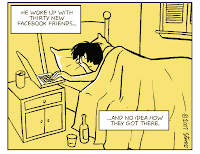
It's that time of year when most people will be drinking until they don't know the difference between Mordechai and Haman. We all know how easy it is to consume copious amounts of alcohol and know how regretful it can sometimes be the morning after.
A hangover is a term used to describe the uncomfortable combination of symptoms that follow after the body has undergone a bout of heavy drinking. Symptoms usually include headache, nausea, fatigue, sensitivity to light and noise and dryness of mouth. These symptoms normally begin some hours after the drinking has stopped. The intensity of the symptoms varies according to the amount one drinks, the kind of beverage consumed and the regularity with which one normally drinks.
Let's try and understand the physiological basis for a hangover. Alcohol has the effect of increasing the amount of urine produced. The medical term for this is that alcohol is a diuretic. Since it is not uncommon for a person to also vomit and sweat when drunk one can understand why a person may suffer from mild dehydration after an alcohol binge resulting in headache and physical discomfort.
Alcohol has the direct effect of causing inflammation of the intestine and stomach (gastritis) and this is especially true with beverages with high alcohol content. This may explain the feeling of nausea associated with drinking.
The type of beverage that you drink will also affect the intensity of the hangover. As well as alcohol, beverages contain a substance called congeners produced in the fermenting process and which give a drink its taste and smell and contributes to the drink's intoxicating effect. Drinks that are pure ethanol such as vodka or gin result in less of a hangover than drinks that contain large quantities of congeners like whisky or red wine.
Treatment for hangover
Hangovers normally last between 8-24 hours but there is a way to limit the intensity of a hangover.
* Don't get drunk quickly. Drink small quantities at one time.
* Consume drinks with pure alcohol – vodka or gin.
* Consume fruits or fruit-juices to stabilize your glucose levels.
* Eat bland foods like toast or crackers (complex carbohydrates) to stabilize glucose levels.
* Rehydrate with water
In summary, a hangover is difficult to prevent in the event that one is going to get totally sloshed but the best one can hope for is damage control. Stick to one type of drink, drink in small amounts, and make sure that one is not drinking on an empty stomach., that way not only Purim will be enjoyable but so will the morning after.
No comments:
Post a Comment